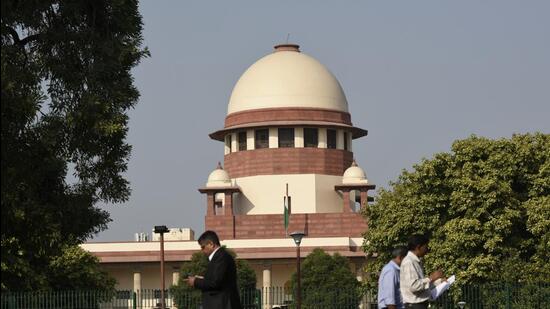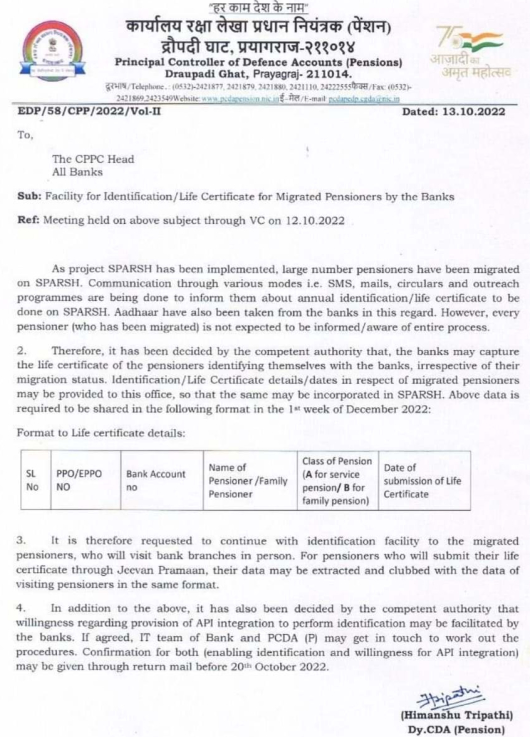FLASH
FLASH
Thursday, 20 October 2022
INSTRUCTIONS FOR SPARSH MIGRATED VETERANS FOR SUBMISSION OF LIFE CERTIFICATE
Wednesday, 19 October 2022
NEW GUIDELINES FOR SUBMISSION OF SPARSH LIFE CERTIFICATE
Friday, 14 October 2022
AIR VETERANS CAN NOW DOWNLOAD THEIR POR FROM THE DAV SITE
Thursday, 29 September 2022
OROP - II WATCH LATEST STATUS
Sunday, 25 September 2022
AN INCIDENT OF DISRESPECT TO THE BODY OF A DEAD SOLDIER AFTER POST MORTUM AT MH
Saturday, 17 September 2022
OROP-2 COURT ORDER DISPOSSNG OFF THE CASE & GRANDING 3 MORE MONTHS EXTENSION UP TO 15 DEC2022
Supreme Court grants Centre time till December to implement OROP
The request for more time was opposed by the original petitioner in the case, Indian Ex Servicemen Movement, which challenged the OROP scheme before the Supreme Court in 2016

NEW DELHI: The Supreme Court on Friday allowed the Centre time till December to implement the one rank one pension (OROP) scheme after being told by the government that re-fixation of pension is a “time consuming” process.
The Centre moved an application for a three-month extension in June, just before the expiry of the deadline set by the Supreme Court in its March 16 ruling that cleared the OROP scheme.
A bench of justices Dhananjaya Y Chandrachud and Hima Kohli allowed the Centre’s application as it noted that some progress had been made since the passing of the order. The application assured the bench that the government was “taking earnest steps” to comply with the court’s directions which require Cabinet approval.
It was pointed out that the mandatory inter-ministerial consultations have been completed and a cabinet note drafted. After completing other formalities, the cabinet note will be sent for approval to the Cabinet Secretariat. “After the approval of the Cabinet, various types of pension tables will be required to be prepared by the Controller General of Defence Accounts (CGDA), which is also a time-consuming process,” the Centre said in its application.Additional solicitor general (ASG) N Venkataraman told the court that though three months have passed since the filing of this application, the government still required a further time of three months.
Acceding to the Centre’s request, the bench was willing to extend the time till December 31 but later modified it by saying three months from today. The three-month period will end by December 15.
The request for more time was opposed by the original petitioner in the case, Indian Ex Servicemen Movement, which challenged the OROP scheme before the Supreme Court in 2016. Senior advocate Huzefa Ahmadi appearing for the petitioner along with advocate Balaji Srinivasan told the court that the retired armed forces personnel have been deprived of the arrears payable to them under the OROP since its launch on November 7, 2015.
The scheme envisaged the re-fixation of pension after every five years. This process was to be done in the year 2019 but this wasn’t done since the matter was pending in court.
In its March judgment, the court said, “We order and direct that in terms of the communication dated November 7, 2015, a re-fixation exercise shall be carried out from July 1, 2019, upon the expiry of five years. Arrears payable to all eligible pensioners of the armed forces shall be computed and paid over accordingly within a period of three months.”
The challenge to the OROP by the petitioner organization and individual ex-servicemen was on two counts. They wanted an automatic revision of pension instead of a five-year periodic revision and even challenged the arbitrary cut-off of July 1, 2014, for determination of pension which put those who retired prior to this date at a disadvantage.
The court did not accept the two demands of the petitioners as it felt that the issue fell purely within the policy domain. The government had informed the court that the estimated budget allocation for defence pensions is ₹1,33,825 crores representing 28.39% of the total defence budget estimate of ₹4,71,378 crores for 2020-2021. This does not include the budget for salaries, which is 34.89% of the total defence budget estimates for 2020-2021.
In its verdict, the court underlined that salaries and pensions accounted for 63% of the defence budget estimates for 2020-2021 and the government was entitled to take into account priorities for modernization of the armed forces and modulate the grant of financial benefits.




